Flinders Street railway station
Flinders Street railway station is located on the corner of Flinders and Swanston streets in the central business district (CBD) of Melbourne, Victoria, Australia. Opened in 1854, the historic station serves the entire metropolitan rail network, as well as some country services to eastern Victoria.[5] Backing onto the Yarra River in the heart of the city, the complex includes platforms and structures that stretch over more than two whole city blocks, from east of Swanston Street nearly to Market Street.
Flinders Street | |
|---|---|
| PTV metropolitan and regional rail station | |
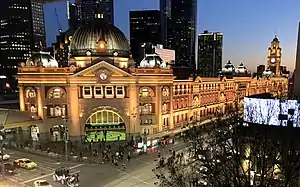 The building illuminated at night, 2018 | |
| Location | 207–361 Flinders Street[1] Melbourne, Victoria 3000 Australia |
| Coordinates | 37°49′05″S 144°58′01″E |
| Owned by | VicTrack |
| Operated by | Metro Trains |
| Line(s) |
|
| Distance | 1.23 kilometres from Southern Cross |
| Platforms | 13 (plus one removed) |
| Tracks | 15 |
| Train operators | |
| Connections | 14 tram routes |
| Construction | |
| Structure type | At-grade |
| Parking | None |
| Bicycle facilities | None |
| Disabled access | Yes |
| Other information | |
| Status | Premium station |
| Station code | FSS |
| Fare zone | 1 |
| Website | Public Transport Victoria |
| History | |
| Opened | 12 September 1854 |
| Electrified | 1500 V DC overhead |
| Previous names | Melbourne Terminus |
| Passengers | |
| 2008–2009 | 24.641 million[2] |
| 2009–2010 | 24.670 million[2] |
| 2010–2011 | 25.187 million[2] |
| 2011–2012 | 26.187 million[2] |
| 2012–2013 | Not measured[2] |
| 2013–2014 | 27.960 million[2] |
| 2014-2015 | Not measured[3] |
| 2015-2016 | 28.087 million[3] |
| 2016-2017 | 27.859 million[3] |
| 2017-2018 | 28.161 million[3] |
| 2018-2019 | 28.320 million[4] |
| Official name | Flinders Street Railway Station Complex |
| Criteria | A, E, F, G |
| Designated | 20 August 1982 |
| Reference no. | H1083[1] |
Flinders Street is served by Metro's suburban services, and V/Line regional services to Gippsland. It is the busiest station on Melbourne's metropolitan network, with an average of 77,153 daily entries recorded in the 2017/18 fiscal year.[3] It was the terminus of the first railway in Australia (the Port Melbourne line) and was reputedly the world's busiest passenger station in the 1920s, owing to the concentration of services there that was only rectified with the construction of the City Loop in the 1970s. Its main platform (operationally divided into platforms 1 and 14) is Australia's longest, and the fourth longest railway platform in the world.[6] Flinders Street is responsible for two of Melbourne's busiest pedestrian crossings, both across Flinders Street, including one of Melbourne's few pedestrian scrambles.
The station's current main building was completed in 1909 and is a cultural icon of Melbourne. The distinctive and eclectic Edwardian building, with its prominent dome, arched entrance, tower and clocks is one of the city's most recognisable landmarks, and its grand, somewhat exotic character led to the popular myth that the design was actually intended for Victoria Terminus in Bombay, India and vice versa, but was swapped in the post.[7][8]
The Melbourne saying "I'll meet you under the clocks" refers to the row of indicator clocks above the main entrance, which show the next departure for each line;[9] the alternative, "I'll meet you on the steps", refers to the wide staircase beneath the clocks.
It has been listed on the Victorian Heritage Register since 1982.[10]
History
Early terminus
The first railway station to occupy the Flinders Street site was called Melbourne Terminus, and was a collection of weatherboard train sheds. It was opened on 12 September 1854 by the Lieutenant-Governor, Charles Hotham.[11] The terminus was the first city railway station in Australia, and the opening day saw the first steam train trip in the country. It travelled to Sandridge (now Port Melbourne), over the since-redeveloped Sandridge Bridge and along the now-light rail Port Melbourne line.
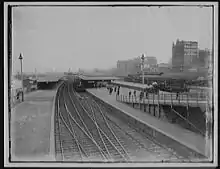
The first terminus had a single platform 30 metres long, and was located beside the Fish Market building on the south-west corner of Swanston and Flinders Streets.[12] An additional platform was provided in 1877, along with two overhead bridges to provide passenger access, followed by additional timber and corrugated iron buildings and a telegraph station in 1879.[11] The first signal boxes were opened at the station in 1883, one at each end of the platforms.[13] By the 1890s, a third island platform had been constructed.[13]
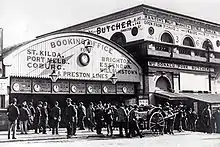
Melbourne's two other early central-city stations, Spencer Street and Princes Bridge, opened in 1859. Spencer Street served the lines to the west of the city, and was isolated from the eastern side of the network until a ground level railway was built connecting it to Flinders Street in 1879,[14] this track being replaced by the Flinders Street Viaduct in 1889.[15]
Princes Bridge was originally separated from Flinders Street, even though it was only on the opposite side of Swanston Street. Once the railway line was extended under the street in 1865 to join the two, Princes Bridge was closed.[16] It was reopened in April 1879, and from 1909 slowly became amalgamated into Flinders Street.[17] Federation Square now occupies its site. Up until the 1880s a number of designs for a new station had been prepared, but none ever went further.[18]
Current building

By the 1880s it was becoming clear that a new central passenger station was needed to replace the existing ad-hoc station buildings; a competition was held in 1883, but the winning design by William Salway, with a pair of grandiose Italianate buildings either side of a rebuilt Princes Bridge, was not built.[19]


A second, more comprehensive design competition was held in late 1899,[20] and 17 entries were received. The competition was essentially for the detailed design of the station building, because of the track and platform layout, the location of the concourse and entrances, that there would be a single platform roof, and even the room layout to some extent, were already decided.[21]
The £500 first prize was awarded in May 1900 to railway employees James Fawcett and H. P. C. Ashworth (Fawcett and Ashworth), whose design, named Green Light, was in the French Renaissance style.[22] It included a large dome over the main entrance, and tall clock tower over the Elizabeth Street entrance, an entrance opposite Degraves Street, and two subways. There was to be a roof over the platforms ‘supported by 12 columns’, of corrugated iron and with minimal amounts of glass to protect against the summer sun, though drawings have not survived.[23] The Swanston Street elevation does survive, which shows an impressive three-arched roof running east–west, with a tall stained glass east end, which most likely was only to cover the concourse.
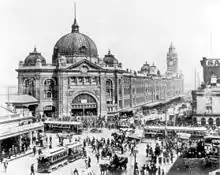
Work began in 1900 on the rearrangement of the station tracks, while the final design of the station building was still being worked on. Work on the central pedestrian subway started in 1901, with the foundations of the main building completed by 1903.
In 1904, in mid construction, the plans were extensively modified by the Railways Commissioners. The proposed train shed was replaced by individual platform roofs, and it was decided not to include the arched concourse roof. To increase office space, a fourth storey was added to the main building, which resulted in the arches above each entrance on Flinders Street being lowered, decreasing their dominance.[24]
In 1905, work began on the station building itself, starting at the west end and progressing towards the main dome. Ballarat builder Peter Rodger was awarded the £93,000 contract. The building was originally to have been faced in stone, but that was considered too costly, so red brick, with cement render details, was used for the main building instead. Grey granite from Harcourt was used for many details at ground level on the Flinders Street side, "in view of the importance of this great public work".[25] The southern facade of the main building consisted of a lightweight timber frame clad with zinc sheets, which were scored into blocks and painted red in order to look like large bricks. That was done to create corridors instead of what were to be open-access balconies inside the scrapped train shed.

Work on the dome started in 1906. The structure required heavy foundations as it extended over railway tracks. In May 1908, work was progressing more slowly than planned, with the expected completion date of April 1909 increasingly unlikely to be met. Rodger's contract was terminated in August 1908.[26] A Royal Commission was appointed in May 1910, finding that Rodger could be held accountable for the slow progress in 1908, but he should be compensated for the difficulties before then. The Way and Works Branch of the Victorian Railways took over the project, and the station was essentially finished by mid-1909. The verandah along Flinders Street, and the concourse roof and verandah along Swanston Street, were not completed until after the official opening in 1910.[26]
The building had three levels at the concourse, or Swanston Street, end, and four at the lower Elizabeth Street, or platform, end. Numerous shops and lettable spaces were provided, some on the concourse, but especially along the Flinders Street frontage, many at lower than street level, accessed by stairs, which created a fifth/basement level. The top three levels of the main building contain a large number of rooms, particularly along the Flinders Street frontage, mostly intended for railway use, but also many as lettable spaces. Numerous ticket windows were located at each entry, with services, such as a restaurant, country booking office, lost luggage office and visitors help booth, at the concourse or platform level. Much of the top floor was purpose-built for the then new Victorian Railway Institute, including a library, gym and a lecture hall, later used as a ballroom. Those rooms have been largely abandoned and decaying since the 1980s. For a number of years in the 1930s and 1940s, the building featured a creche next to the main dome on the top floor,[27] with an open-air playground on an adjoining roof. Since 1910, the basement store beside the main entrance has been occupied by a hat store, known as 'City Hatters' since 1933.
The first electric train service operated from Flinders Street to Essendon in 1919,[15] and by 1923 it was thought to be the world's busiest passenger station, with 2300 trains and 300,000 passengers daily.[28] In 1954, to cater for increasing traffic, as well as for the 1956 Summer Olympics, the Degraves Street subway from the station was extended to the north side of Flinders Street, creating Campbell Arcade.[15] In March 1966, platform 1 was extended to 2,322 feet (708 m) long.[29]
Redevelopment plans
Plans arose at various times from the 1960s to the 1970s for the demolition or redevelopment of the station, as well as the adjacent Jolimont Yard area. The station had fallen into disrepair, having not been cleaned in decades, and covered with advertising hoardings and light up signs.[30]
In 1962, the Minister for Transport and HKJ Pty Ltd signed an agreement for a £30 million redevelopment of the station that would have resulted in the demolition of the clock tower and replacement with an office building up to 60 stories high. Work was to begin in 1964, but instead the Gas & Fuel Building was constructed over Princes Bridge station.[31] In 1967 a company purchased the option to lease the space above Flinders Street Station, planning to build a shopping plaza and two office towers, the dome and clock tower being kept as part of the design, but strong opposition saw this project lapse.[31]
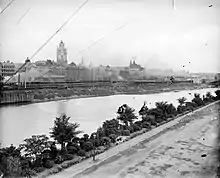
In 1972, Victorian Premier Henry Bolte unveiled another redevelopment plan, to cover 27 acres (110,000 m2) of space above the station and Jolimont Yard for a complex of shops, offices, theatres and other community facilities. A newspaper report of 1974 said that planning was still underway for the $250 million proposal, but by 1975, public perceptions had begun to turn towards retention of the station.[31] A Builders Labourers Federation green ban at the time helped preserve it in its existing form.[32] The controversy over these proposals led to a re-apprasial of the architecture and significance of the station, which had been seen as something of an oddity, or even simply as dirty and ugly, such that it was classified by the National Trust of Australia (Victoria) by 1976, and eventually listed on the state Heritage Register in 1982.

In 1989, under the John Cain government, an agreement to construct a "Festival Marketplace" was signed. Designed by Daryl Jackson architects, it was to be built over the existing platforms in a style sympathetic to the existing station, and be completed by 1992. Planned to feature shops, restaurants and cafes, the project was abandoned in 1991 after the inability of the financiers to come up with the $205 million required due to the early 1990s recession.[33]
In November 2011, the Victorian Government launched a $1 million international design competition to rejuvenate and restore the station. In October 2012, after receiving 118 submissions, six finalists were selected.[34] The public could vote and the jury's choice and people's choice winner were announced on 8 August 2013. The competition winner was Hassell + Herzog & de Meuron, while the people's choice winner were University of Melbourne students Eduardo Velasquez, Manuel Pineda and Santiago Medina.[34][35][36] No funding was attached to the competition, and no major changes were undertaken.
Refurbishment
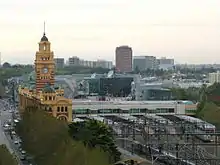


The Swanston Street concourse has undergone the most change of any part of the station, and is now three times the depth of the original structure, and only the canopy and roofed area on Swanston Street remains of the original. After the first round of works in 1985 a City of Melbourne councillor, Trevor Huggard, described the renovation as "vandalism of historically important sections of the station", and in 1997 the National Trust of Australia described the additions to the concourse as unsympathetic and detrimental to the station, having "the character of a modern shopping centre".[37]
The television displays used to display next train information were added to each platform in July 1980.[38]
In 1982, a $7 million refurbishment was announced by the Minister for Transport, Steven Crabb, divided into four phases, designed by the railways architect Kris Kudlicki.[39] Completed by 1984, the first escalators at the station provided on platforms 2 and 3 replaced ramps, and new public toilets were provided, replacing those over the platforms.[40] The main station concourse was tiled and extended westward over the tracks, with skylights added above the ramps, and 16 new shops opened on the concourse. A restaurant was built on the southern side facing the river,[41] which opened in October 1985, but closed soon after, instead becoming the "Clocks on Flinders" poker machine venue in 1994.[42] The main steps were embedded with electrical circuits to keep them dry in June 1985.
In 1993, the Elizabeth Street subway was extended and opened at the Southbank end.[42] Conservation work was also carried out to the main building, with the external facade repainted, exterior feature lighting installed, and the stained glass feature windows above each entry restored.[43] Further changes were made through the late 1990s with the opening of access from the main Swanston Street concourse to platform 1, platform resurfacing with tactile tiles, and the replacement of the remainder of the original platform access ramps (except platform 10) with escalators and elevators.[44][45]
The tracks to the east of the station were rebuilt between 1997 and 1998 to clear the way for the Federation Square project.[46] Jolimont Yard was eliminated, with $40 million spent to reduce 53 operating lines between Flinders Street and Richmond Station to just 12. The number of points was also reduced, from 164 to 48.[47] These changes also saw a reallocation of platform usage at the station, country trains being shifted from platform 1 to platform 10, and Clifton Hill group trains being shifted from the deleted Princes Bridge station to platform 1.[29]
The final round of changes were completed by 2007. It included refurbishment of the building roof and concourse foundations, an upgrade of platform 10 with escalators and a lift replacing the ramp, the relocation of all ticket booking offices to the main entrance under the main dome and new LCD passenger information displays installed on the platforms, subways and concourse.[48] In March 2009 an escalator replaced the lift to platform 12 and 13, with platform 13 also extended west into daylight along the alignment of the former platform 11.[49]
In 2008, the retail pavilions on the concourse were rebuilt, increasing their area. An investigation of the potential of the abandoned spaces in the station, overseen by a task force comprising representatives from Connex, the Committee for Melbourne, Melbourne City Council, Heritage Victoria, was completed the same year, but the conclusions were not made public.[50] In January 2010, one of the first announcements by the new Minister for Public Transport was that the government was investigating the refurbishment of the abandoned spaces for "cultural uses".[51]
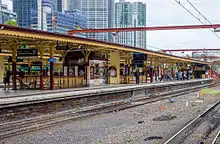
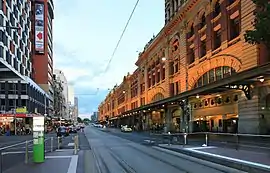
In mid-February 2015, Premier Daniel Andrews and Minister for Public Transport Jacinta Allan announced that $100 million would be spent for urgent refurbishment works to upgrade station platforms, entrances, toilets, information displays and to restore the exterior of the main building.[52] By July 2017, the station had been almost completely repainted in the original 1910 colours.[53][54]
As painting continued in January 2018, a further round of works was announced including the renewal of the Elizabeth Street pedestrian subway and rebuilding of the subway's south entrance to include direct access to platform 10.[55]
Clocks
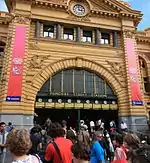
The distinctive clocks under the main dome that show the departure times of the next trains date back to the 1860s. Sixty Bathgate indicators were purchased from England for use at the Flinders Street, Spencer Street, Richmond and South Yarra stations. Those at Flinders Street were placed into storage when the old station was demolished in 1904, with 28 placed into the new station in 1910. They were located at the main entry under the dome, the southern side archway, and the Degraves and Elizabeth Street entrances.[56]
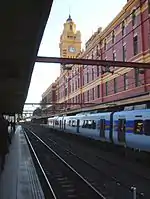
Manually operated by a railway officer using a long pole, during an 8-hour period the clocks at the main entrance were changed an average of 900 times.[56] The original indicator clocks were removed from service in 1983 as part of a redevelopment of the station, with their replacement by digital displays planned. An outpouring of public outrage and sentimentality saw the decision reversed within one day. The clocks at the main entrance were altered to automatic operation by computer, but those at the Degraves and Elizabeth Street entrances were replaced by large airport-style split-flap displays.[56]
The space "under the clocks" or "on the steps" leading to the dome has been a popular informal meeting place for Melburnians since the station's opening. Although the area was not intended for this purpose, and there is no seating or other infrastructure to suggest it as a destination, the location – opposite the well-known Young and Jackson Hotel and overlooking two of the busiest tram routes in the city – means it is accessible and visible to many of the city's main pedestrian thoroughfares. Many people who meet "under the clocks" do not arrive by train; the site's cultural significance extends beyond its main function as a transport hub.[57]
A clock tower has also existed at the end of Elizabeth Street since 1883. The first clock was known as the 'Water Tower Clock', after a wooden framed water tower erected on the site in 1853. This clock remained in place until 1905 when work begun on the new station, the clock tower being moved to outside Princes Bridge station.[58] In 1911 it was moved to Spencer Street station, where it remained until the station was redeveloped in 1967. Sold to a private collector, it was returned to public ownership and in 1999 was put on display at the Scienceworks Museum, Spotswood.[58] It was returned to the renamed Southern Cross station in 2014.[59]
Today's Elizabeth Street clock tower was constructed between August 1906 and November 1907, the clock being built by Melbourne clock maker F. Ziegeler to an English design. Originally needing to be wound every day, it is now electrically operated.[60] It was cleaned and overhauled between 2017 and 2018 before being fully restored to service.[61][62]
Signal boxes

The first signal boxes were opened at the station in 1883, one at each end of the platforms. From the 1900s until 1983, five signal boxes controlled traffic into the station.[63]
Flinders Street A was located at the western end of the station, between the lines to St Kilda/Port Melbourne and Spencer Street, and controlled all traffic from the west. It was of "traditional" Victorian Railways design, in brick, and had two mechanical lever frames of equal size, totalling 280 levers.[64] The mechanical signals were decommissioned in October 1979.[65] The signal box has been burnt twice, the second time being in 2002,[66] destroying the timber and glass superstructure and slate roof. In 2009, it was rebuilt as Signal, a youth arts centre funded by the City of Melbourne.[67]
Flinders Street B was located at the Richmond end of platforms 8 and 9 and controlled the southern tracks from Jolimont Yard. It was of traditional VR design, in brick, and was demolished when the Federation Square deck was built.
Flinders Street C was located beyond the Richmond end of platforms 4 and 5 and controlled the northern tracks from Jolimont Yard. It was of traditional VR design and was demolished together with Flinders Street B.
Flinders Street D was located at the Richmond end of the Princes Bridge island platform (later incorporated into Flinders Street as platforms 15 and 16). The structure, of utilitarian brick construction, remains today, just beyond the Federation Square deck.
Flinders Street E was located at Richmond Junction, and controlled the junction as well as access into the Richmond end of the stabling sidings. Of utilitarian brick construction, it remains in place today underneath the William Barak Bridge.
Since 1983, the station has been remotely controlled by Metrol. The station precinct is operated by four interlockings corresponding to former signal boxes A, B, D and E.[68]
Platforms
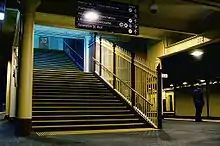
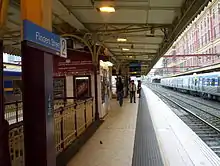
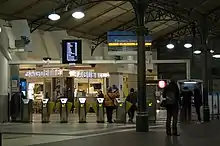
The platform layout at Flinders Street is unusual among Australian terminal stations for being almost entirely composed of through tracks – a product of the constrained geography of the site and the haphazard development of the rail network around it.[69] The first platform at the station, constructed near and parallel to Flinders Street itself, was barely 30 m (98 ft) long, and allowed trains from Port Melbourne to terminate.[11] The opening of the rail connection under Swanston Street in 1865 enabled trains from Brighton to access the platform,[70] and so it was later extended to enable the simultaneous arrival of trains from the east and west.[16]
A second platform to the south of the first was provided in 1877, after the amalgamation of railway companies began to increase traffic at the station.[71] Platform expansion began in earnest following the 1882 recommendation that Flinders Street be developed as a major terminal, and the subsequent government acquisition of the railways; between 1889 and 1892, three further platforms were constructed on land acquired from the former fish market in anticipation of additional traffic, which eventuated when Essendon, Coburg and Williamstown trains were routed across the viaduct in 1894.[72] Development continued with the completion of the 1899 ground plan, which specified a total of 11 platforms – platform 1 along the main building and five pairs of island platforms to the south. The remaining platforms were constructed as works progressed on the main building, and in 1909, a decision was made to extend platforms 10 and 11 eastwards, creating two new platforms numbered 12 and 13.[17]
Railway officials proposed amalgamating the nearby Princes Bridge station with Flinders Street with improved passenger connections in the 1890s, but failed to obtain funding from the state government for the project despite the massive redevelopment works.[73] Nevertheless, the two stations were merged for signalling and operational purposes in 1910,[74] and in 1966, platform 1 at Flinders Street was extended to meet its counterpart at Princes Bridge, creating a single platform face with a length over 800 m (2,600 ft).[75] The west end of platform 1 could also be used as a separate "Platform 1 West".[76] Eventually, in 1980, Princes Bridge was formally incorporated into Flinders Street and its three platforms were renumbered 14, 15 and 16.[77]
Several platforms were decommissioned in the early 1990s following reductions in suburban train services. Platform 11 fell into disuse following the closure of the Port Melbourne line in 1987, and platforms 14, 15 and 16 were closed to regular services, along with the west end of platform 1.[76] Although proposals were made to reopen it by the East West Link Needs Assessment, the platform 11 site was converted into a bar and restaurant in 2014.[78] Platforms 15 and 16 were demolished to make way for Federation Square, but platform 14 remains intermittently in use.[79]
A short dock platform, known as the Milk Dock or Parcels Dock, was constructed in 1910 to the north of platform 1 at the west end of the main building.[80] Prior to the widespread transport of dairy products by road, the dock was a distribution centre for milk and other small goods arriving in Melbourne on early morning trains from Gippsland.[81] Other small goods and parcels were later also loaded at the dock until most such traffic ceased in the 1960s.[82] The structure remains essentially intact.[83]
Three concourses link the platforms. The main concourse is at the east end of the station, located off Swanston Street and the main dome, and has direct access to all platforms via escalators, stair and elevators. The Degraves Street subway runs under the centre of the station, exiting to Flinders Street at the north end, with stairs directly connecting to all platforms except for platform numbers 12 and 13. The Elizabeth Street subway is at the west end, and has direct access via ramps to all platforms except for platforms 12, 13 and 14, and via a stairway to platform 1, reopened in 2017.[84]
Trains may use a different platform if the platform it is originally scheduled at is occupied.
Platform 1:
Destinations via City Loop – Clifton Hill Group:
- Hurstbridge line all stations and limited stop services to Hurstbridge
- Mernda line all stations and limited stop services to Mernda
Platform 2 & 3:
Destinations via City Loop – Burnley Group:
- Belgrave line all stations and limited stop services to Belgrave
- Lilydale line all stations and limited stop services to Lilydale
- Glen Waverley line all stations and limited stop services to Glen Waverley
- Alamein line weekday all stations and limited stop services to Alamein
Platform 4 & 5:
Destinations via City Loop – Northern Group:
- Craigieburn line all stations and limited stop services to Craigieburn
- Upfield line all stations and limited stop services to Upfield
- Sunbury line all stations and limited stop services to Watergardens & Sunbury
Destinations via Richmond (platform 4 only):
- Belgrave line all stations and limited stop services to Blackburn
- Lilydale line all stations and limited stop services to Blackburn
- Alamein line weekday all stations and limited stop services to Alamein
Platform 6 & 7:
Destinations via Richmond:
- Pakenham line express services to Pakenham
- Cranbourne line express services to Cranbourne
- Gippsland line V/Line services to Traralgon & Bairnsdale (pick up only)
- Gippsland line V/Line services to Southern Cross (set down only)
Platform 8 & 9:
Destinations via Richmond:
- Frankston line all stations and limited stop services to Frankston
Destinations via Southern Cross (platform 9 only):
- Werribee line all stations and limited stop services to Laverton & Werribee
- Williamstown line all stations services to Williamstown
Platform 10:
Destinations via Southern Cross:
- Werribee line weekday all stations and limited stop services to Laverton & Werribee
- Williamstown line weekday all stations services to Williamstown
- Flemington Racecourse line limited stop services to Showgrounds and/or Flemington Racecourse (special event days only)
Platform 12 & 13:
Destinations via Richmond:
- Sandringham line weekday all stations services to Sandringham
Platform 14:
Destinations via City Loop – Clifton Hill Group:
- Hurstbridge line all stations and limited stop services to Hurstbridge
- Mernda line all stations and limited stop services to Mernda
Transport links
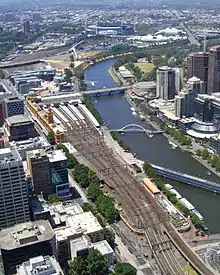

Dysons operates eight routes via Flinders Street:
- Night Bus 941: to Watergardens station via Footscray, Sunshine North, Taylors Lakes (Saturday and Sunday mornings only)[85]
- Night Bus 942: to St Albans station via Footscray, Sunshine, Deer Park (Saturday and Sunday mornings only)[86]
- Night Bus 944: to Point Cook via Newport, Altona, Altona Meadows (Saturday and Sunday mornings only)[87]
- Night Bus 945: to Wyndham Vale station via Tarneit, Hoppers Crossing, Werribee (Saturday and Sunday mornings only)[88]
- Night Bus 951: to Glenroy station via Moonee Ponds, Brunswick West, Pascoe Vale (Saturday and Sunday mornings only)[89]
- Night Bus 952: to Broadmeadows station via Footscray, Maribyrnong, Airport West, Gladstone Park (Saturday and Sunday mornings only)[90]
- Night Bus 955: to Mernda via Brunswick, Ivanhoe, Bundoora, Mill Park, South Morang (Saturday and Sunday mornings only)[91]
- Night Bus 961: to Doncaster via Collingwood, Templestowe (Saturday and Sunday mornings only)[92]
Ventura Bus Lines operates two routes via Flinders Street:
- Night Bus 966: to Box Hill station via Kew, Doncaster (Saturday and Sunday mornings only)[93]
- Night Bus 969: to Ringwood station via Caulfield, Rowville, Wantirna (Saturday and Sunday mornings only)[94]
Yarra Trams operates 14 services via Flinders Street, Swanston Street and Elizabeth Street:
| No. | Route | Stop location | Ref |
|---|---|---|---|
| East Coburg – South Melbourne Beach | Swanston Street | [95] | |
3a |
Melbourne University – Malvern East | Swanston Street | [96] |
| Melbourne University – Malvern | Swanston Street | [97] | |
| Moreland station – Glen Iris | Swanston Street | [98] | |
| Melbourne University – Kew | Swanston Street | [99] | |
| to Coburg North | Elizabeth Street | [100] | |
| City Circle | Flinders Street | [101] | |
| to West Maribyrnong | Elizabeth Street | [102] | |
| to Airport West | Elizabeth Street | [103] | |
| Melbourne University – Brighton East | Swanston Street | [104] | |
| Melbourne University – Carnegie | Swanston Street | [105] | |
| Wattle Park – The District Docklands SC | Flinders Street | [106] | |
| Melbourne University – Deepdene | Swanston Street | [107] | |
| Vermont South – Central Pier | Flinders Street | [108] | |
Footnotes
- "Flinders Street Railway Station Complex". Victorian Heritage Database. Government of Victoria. Archived from the original on 13 May 2018. Retrieved 22 July 2018.
- "Train Station Patronage FY2008-2014". Public Transport Victoria. 14 May 2015. Archived from the original (XLS) on 30 March 2016. Retrieved 1 November 2016. (access from Archived 3 November 2016 at the Wayback Machine)
- "Station Patronage Data 2013-2018". Philip Mallis. Transport for Victoria. Retrieved 4 November 2019.
- "Metro Train Station Patronage (from 2005-06 to 2018-2019)". Department of Transport. Retrieved 27 July 2020.
- "Melbourne's iconic Flinders Street Station to undergo changes". SBS. 21 September 2015. Retrieved 26 November 2017.
- "Flinders Street Railway Station". City of Melbourne.
- "Flinders Street Railway Station". www.onlymelbourne.com.au. Retrieved 28 June 2020.
- "Secrets of Melbourne's Historic Flinders Street Station, Slated for Redesign". Untapped New York. 11 February 2014. Retrieved 28 June 2020.
- "Meet me under the clocks". Culture Victoria. 9 October 2012. Retrieved 25 August 2020.
- "Flinders Street Railway Complex - Victorian Heritage Database Report". Victorian Heritage Council. 25 August 2020. Retrieved 25 August 2020.
- Davies 2009, p. 6.
- Davies 2009, p. 8.
- Davies 2009, p. 10.
- "City of Melbourne: Roads > Spencer Street". Archived from the original on 25 July 2008.
- "Some Significant Dates in the History of the City of Melbourne" (PDF). City of Melbourne. p. 8. Archived from the original (PDF) on 25 August 2006.
- Davies 2009, p. 12.
- Davies 2009, p. 28.
- Davies 2009, pp. 20–21.
- "PRIZE DESIGNS FOR NEW RAILWAY STATIONS". Illustrated Australian News (Melbourne, Vic. : 1876 - 1889). 16 May 1883. p. 72. Retrieved 27 June 2020.
- "CENTRAL RAILWAY STATION". Age (Melbourne, Vic. : 1854 - 1954). 9 August 1899. p. 6. Retrieved 27 June 2020.
- Davies 2009, p. 20.
- "THE NEW CENTRAL RAILWAY STATION". Argus (Melbourne, Vic. : 1848 - 1957). 30 May 1900. p. 10. Retrieved 27 June 2020.
- "THE NEW CENTRAL STATION". Age (Melbourne, Vic. : 1854 - 1954). 30 May 1900. p. 5. Retrieved 27 June 2020.
- Davies 2009, pp. 24–31.
- Davies 2009, p. 24.
- Davies 2009, p. 38.
- Egger, Simone; McClymont, David (2004). Melbourne. Lonely Planet. p. 59. ISBN 9781740597760. Retrieved 26 July 2019.
- "FLINDERS STREET STATION". Moree Gwydir Examiner and General Advertiser (NSW : 1901 - 1940). 30 August 1923. p. 3. Retrieved 28 June 2020.
- Winter, Vincent Adams (1990). VR and VicRail: 1962 - 1983. pp. 204, 206. ISBN 0-9592069-3-0.
- Davies 2009, p. 320.
- Davies 2009, p. 316–319.
- Burgmann, Verity and Meredith (1998). Green Bans, Red Union: Environmental Activism and the New South Wales Builders Labourers' Federation. p. 50.
- Davies 2009, p. 322.
- "About". Flinders Street Station Design Competition. Major Projects Victoria. 2013. Archived from the original on 15 March 2015.
- Carey, Adam (8 August 2013). "Flinders Street redesign competition won by HASSELL + Herzog & de Meuron". The Age. Retrieved 26 July 2019.
- Harris, Amelia; Landy, Samantha (8 August 2013). "Flinders St station design has some raving and others railing". Herald Sun. Retrieved 26 July 2019.
- Davies 2009, p. 182.
- "News". Newsrail. Australian Railway Heritage Society: 215. September 1980.
- Robinson, Paul (15 November 2019). "From the Archives, 1982: Big new plan for Flinders Street Station". The Age. Retrieved 15 November 2019.
- Davies 2009, p. 191.
- "News". Newsrail. Australian Railway Heritage Society. 12 (10): 315. October 1984.
- Davies 2009, p. 192.
- Davies 2009, p. 324.
- "Flinders Street Station". Department of Infrastructure. 2 June 2007. Archived from the original on 23 May 2007.
- "More Service Improvements for Public Transport". Minister for Transport. 18 March 1996.
- Jodie Misiak. "Federation Square: Masterpiece or Publicly-Funded Folly?" (PDF). Archived from the original (PDF) on 20 September 2006. Retrieved 2008-07-26.
- "Leighton Contractors: Jolimont Rationalisation Project" (PDF). Leighton Contractors. Archived from the original (PDF) on 29 August 2007. Retrieved 26 July 2008.
- Media Release: State Government Moves to Save Melbourne’s Most Famous Dome Archived 30 March 2011 at the Wayback Machine Victorian Government 28 February 2006
- "Improved Access to Flinders Street Station for Sandringham Line Passengers". Media Replace:Premier of Victoria, Australia. premier.vic.gov.au. 19 March 2009. Archived from the original on 5 June 2009. Retrieved 6 May 2009.
- "Media Release: Flinders Street Station to Get Major Upgrade 25 November 2005". Archived from the original on 16 September 2007. Retrieved 18 September 2007.
- At 100, grand old station in line for arts refit The Age 22 January 2010
- "Flinders Street Station redevelopment". Retrieved 17 August 2016.
- "Flinders Street Station to be repainted in its original colours". Broadsheet.com.au. 13 October 2016. Retrieved 26 November 2017.
- Jefferson, Andrew. "Commuters get their first look at newly painted Flinders St Station". Herald Sun (6 July 2017). Retrieved 9 November 2017.
- Carey, Adam (14 January 2018). "New security cameras and station entrance to ease pressure on City Loop". The Age. Retrieved 16 January 2018.
- Davies 2009, p. 48.
- Hawkes, Lesley (2012). "City Meeting Places: Melbourne's Hungry Jack's and Melbourne's Flinders Street Station". In Elder, Catriona; Moore, Keith (eds.). New Voices, New Visions: Challenging Australian Identities and Legacies. Cambridge Scholars Publishing. pp. 37–49. ISBN 9781443838214. Retrieved 24 July 2019.
- Davies 2009, p. 46.
- "Original Flinders Street clock to be installed at Southern Cross" Railway Digest February 2014 page 23
- Davies 2009, p. 44.
- Preiss, Benjamin (8 November 2017). "Flinders Street clock hasn't dropped a minute in 100 years". The Age. Retrieved 24 July 2019.
- Alvaro, Alexandra (31 January 2018). "Flinders Street Station clock returns in tick-tock shape". The Age. Retrieved 24 July 2019.
- "Victorian Railways signal diagram: Flinders Street 2 65". signaldiagramsandphotos.com. Retrieved 15 August 2008.
- "Flinders Street "A" signal cabin". signalbox.org. Archived from the original on 16 January 2017. Retrieved 6 May 2009.
- "Market Street Signal Bridge". Signalling Record Society Victoria. Archived from the original on 31 October 2009. Retrieved 6 May 2009.
- "Vicsig - Infrastructure - Flinders Street A". vicsig.net. Retrieved 6 May 2009.
- "Invitation to Register: Expression of Interest for Signal Art Commission 2009" (PDF). City of Melbourne. Retrieved 6 May 2009.
- "Infrastructure: Flinders Street". Vicsig. Retrieved 13 February 2019.
- Nock 1971, p. 123; Richards & MacKenzie 1986, p. 86.
- Harrigan 1962, p. 59.
- Davies 2009, p. 7.
- Lee 2007, p. 85; Priestly 1984, p. 131.
- Fiddian 2003, p. 10.
- Lambert & Jungwirth 1996, p. 121.
- Fiddian 1997, p. 120.
- Mees 2008, p. 27.
- Fiddian 1997, p. 133.
- Devic, Aleks (1 June 2014). "Longest bar to follow disused train track". Herald Sun. Retrieved 8 August 2019.
- Mees 2008, p. 28.
- Heritage Victoria 2014, p. 24.
- Davies 2009, p. 135.
- Heritage Victoria 2014, p. 26.
- Heritage Victoria 2014, p. 5.
- Wong, Marcus. "Long corridor between the recently reopened platform 1 staircase and the Elizabeth Street subway". Wongm's Rail Gallery. Retrieved 18 October 2020.
- "941 Night bus: City - Footscray - Sunshine North - Taylors Lakes - Watergardens". Public Transport Victoria.
- "942 Night bus: City - Footscray - Sunshine - Deer Park - St Albans". Public Transport Victoria.
- "944 Night bus: City - Newport - Altona - Altona Meadows - Point Cook". Public Transport Victoria.
- "945 Night bus: City - Geelong Rd - Tarneit - Hoppers Crossing - Werribee - Wyndham Vale". Public Transport Victoria.
- "951 Night bus: City - Moonee Ponds - Brunswick West - Pascoe Vale - Glenroy". Public Transport Victoria.
- "952 Night bus: City - Footscray - Maribyrnong - Airport West - Gladstone Park - Broadmeadows". Public Transport Victoria.
- "955 Night bus: City - Brunswick - Ivanhoe - Bundoora - Mill Park - South Morang - Mernda". Public Transport Victoria.
- "961 Night bus: City - Collingwood - Eastern Fwy - Templestowe - Doncaster". Public Transport Victoria.
- "966 Night bus: City - Kew - Doncaster Rd - Box Hill". Public Transport Victoria.
- "969 Night bus: City - Caulfield - Ferntree Gully Rd - Rowville - Wantirna - Ringwood". Public Transport Victoria.
- "1 East Coburg - South Melbourne Beach". Public Transport Victoria.
- "3-3a Melbourne University - East Malvern". Public Transport Victoria.
- "5 Melbourne University - Malvern". Public Transport Victoria.
- "6 Moreland - Glen Iris". Public Transport Victoria.
- "16 Melbourne University - Kew via St Kilda Beach". Public Transport Victoria.
- "19 North Coburg - Flinders Street Station & City". Public Transport Victoria.
- "35 City Circle (Free Tourist Tram)". Public Transport Victoria.
- "57 West Maribyrnong - Flinders Street Station & City". Public Transport Victoria.
- "59 Airport West - Flinders Street Station & City". Public Transport Victoria.
- "64 Melbourne University - East Brighton". Public Transport Victoria.
- "67 Melbourne University - Carnegie". Public Transport Victoria.
- "70 Waterfront City Docklands - Wattle Park". Public Transport Victoria.
- "72 Melbourne University - Camberwell". Public Transport Victoria.
- "75 Etihad Stadium Docklands - Vermont South". Public Transport Victoria.
Bibliography
- Determination by the Heritage Council of Victoria to Amend an Existing Registration: Flinders Street Railway Station Complex. Heritage Council of Victoria. 19 September 2014. Retrieved 8 August 2019.
- Davies, Jenny (2009). Beyond the Façade: Flinders Street, more than just a railway station. Publishing Solutions. ISBN 978-1-921488-03-0.
- Fiddian, Marc (1997). Trains, tracks, travellers : a history of the Victorian railways. Pakenham: South Eastern Independent Newspapers. ISBN 1875475125.
- Fiddian, Marc (2003). Flinders St Station : Melbourne's Taj Mahal. Hastings: Galaxy Print and Design. ISBN 0958170460.
- Lambert, Keith W.; Jungwirth, Alan, eds. (1996). Weekly notice extracts 1894-1994. Cheltenham: Weekly Notice Productions. ISBN 0646300105.
- Harrigan, Leo J. (1962). Victorian Railways to '62. Melbourne: Victorian Railways Public Relations and Betterment Board.
- Lee, Robert S. (2007). The Railways of Victoria 1854-2004. Melbourne University Press. ISBN 9780522851342.
- McKillop, Robert F.; Ellsmore, Donald; Oakes, John (2008). A century of Central : Sydney's Central Railway Station 1906 to 2006. Redfern: Australian Railway Historical Society/NSW Division. ISBN 9780975787069.
- Mees, Paul (July 2008). "Does Melbourne need another central city rail tunnel?" (PDF). RMIT University. Retrieved 8 August 2019.
- Nock, Oswald Stevens (1971). Railways of Australia. London: A. & C. Black. ISBN 0713611901.
- Otto, Kristin (2009). Capital : Melbourne at the centre of the world 1901-1927. Melbourne: Text Publishing Company. ISBN 9781921520778.
- Priestly, Susan (1984). Making their mark. Melbourne: Fairfax, Syme & Weldon. ISBN 0949288039.
- Richards, Jeffrey; MacKenzie, John M. (1986). The railway station : a social history. Oxford & New York: Oxford University Press. ISBN 0192158767.
External links
| Wikimedia Commons has media related to Flinders Street Station. |
| Wikisource has original text related to this article: |
- Flinders Street Station, historic images and original architectural plans at Culture Victoria
- Melway map at street-directory.com.au